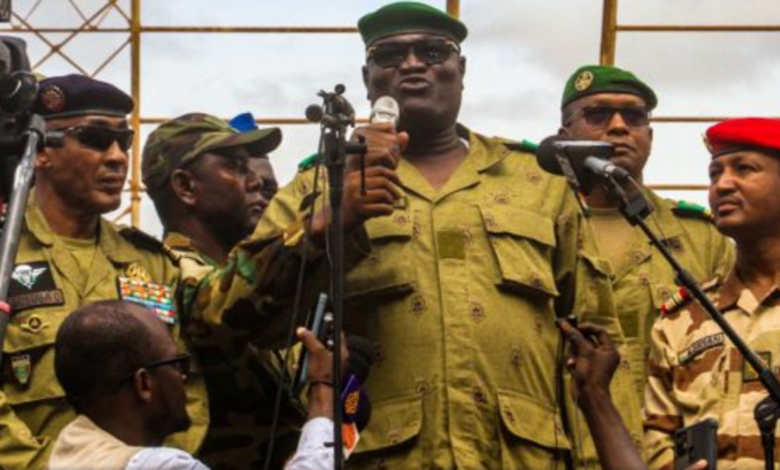The coup in Niger could significantly hinder Nigeria’s anti-terrorism efforts against Boko Haram and the Islamic State in North East Nigeria, destabilise the wider region, and further jeopardise democratic governance, observers say.
The recent coup in Niger, and the subsequent closure of the country’s airspace have sparked concern among global counter-terrorism strategists that the fight against insurgent groups in Nigeria and the wider region, could be seriously set back.
The grounding of French and US drones will impede the fight against extremist groups like Boko Haram and the Islamic State’s West Africa Province (ISWAP) in North East Nigeria, experts warn.
“The prospects of a coup in Niger and the subversion of democratic governance are not good for regional, intercontinental, and global counterterrorism efforts,” says Kabiru Adamu, CEO of Beacon Consulting.
Currently, the Nigerian military does not possess the level of drone technology housed at the French and US bases, it is understood. It is unclear if the Nigerian military can replace any intelligence gathered by those drones and shared by allies.
“The Niger Republic has emerged as a strategic player in the current counter-terrorism efforts at the regional and global levels,” Adamu says.
While Niger’s attention is diverted by the crisis, the threat from terrorism in the Sahel and West Africa increases, underlining the crucial role Niger plays in the region, he says.
Collapse
The coup and its aftermath have serious implications for the wider West African region.
Alarmingly, non-state armed groups contest nearly 70 per cent of Burkina Faso’s regions, and control almost half of Mali.
With the recent developments in Niger, the G5 Sahel initiative, aiming to combat terrorism and boost regional stability, is at risk of being dismantled.
Initially the G5 was headquartered in Mali. A move to Niger was being considered after a coup there in 2021. However, with Niger’s political instability, such a move is now unlikely.
“The immediate collapse of the G5 initiative leaves a vast open territory for non-state armed groups to continue their advancement,” warns Adamu.
The coup may also affect Niger’s membership in the Multinational Joint Task Force (MNJTF), further undermining the effectiveness of cross-border operations.
Already, tensions are rising between the Nigerian and Nigerian militaries, which can only benefit the “bad guys” by giving them room to advance their fronts, Adamu says.
The country is a vital cog in the intelligence-sharing machine that powers global efforts to stem terrorism financing. A decision to withdraw from these efforts could hamper global counter-terrorism operations.
“In countering violent extremism, the component of counter-terrorism also talks about winning the hearts and minds of the people,” Adamu adds.
Inflamed sentiment
If the Economic Community of West African States (Ecowas) and other bodies perceive the coup as against the national interest, terrorist groups could leverage this for recruitment.
Military intervention could further inflame sentiments and provide fertile ground for extremists to mobilise and recruit from the Nigerien population.
Furthermore, the crisis in Niger has significant implications for the presence of global powers in the region.
Currently, French and US assets are stationed in the country, with Germany also considering similar deployments.
If these nations recognise the coup as such, they may be forced to withdraw or relocate their assets – a move, Adamu said, “could severely impact international efforts against terrorism.”
“The implication for the presence of global capabilities, as it were, in Niger is enormous. If the US recognises what happened as a coup, its foreign policy will require it to take certain stands against Niger, possibly relocating some of its military assets.”
The withdrawal or relocation of these global assets would come at a significant cost to the international efforts against terrorism and several other security components within the continent and the region.
It would create a void in terms of resources, intelligence, and operational capabilities, providing an opportunity for extremist groups to regroup, reorganise, and expand their influence.
Also, if Ecowas does intervene in Niger, and Niger’s allies the military governments of Mali and Burkina Faso come to Niger’s aid, that could leave space for the insurgent groups to expand into.
‘Hearts and minds’
The Niger crisis has illuminated the fragile balance of power in the fight against extremism. Its resolution will resonate far beyond Nigeria’s borders, impacting the future of counter-terrorism efforts in a region that has become the epicentre of global terrorism.
The international community is now faced with a delicate situation and must tread carefully, recognising that their actions will significantly influence the trajectory of the fight against Boko Haram and ISWAP.
The strategic importance of Niger in the counter-terrorism landscape and its potential to become a hotbed for extremist activities calls for a balanced and measured approach.
The Niger crisis also highlights the complex interplay of regional politics, global security interests, and the fight against extremist ideologies.
The current predicament serves as a stark reminder of how the political instability of one nation can have far-reaching implications for regional security and global counter-terrorism efforts.
The possibility of extremist groups capitalising on the current unrest for recruitment and mobilisation is another critical concern.
“It would allow them the weapon, as it were, to mobilise and recruit from within the majority of the Nigerien population,” says Adamu.
This highlights the importance of winning the “hearts and minds” of the local population, a critical factor in preventing the spread of extremist ideologies.

